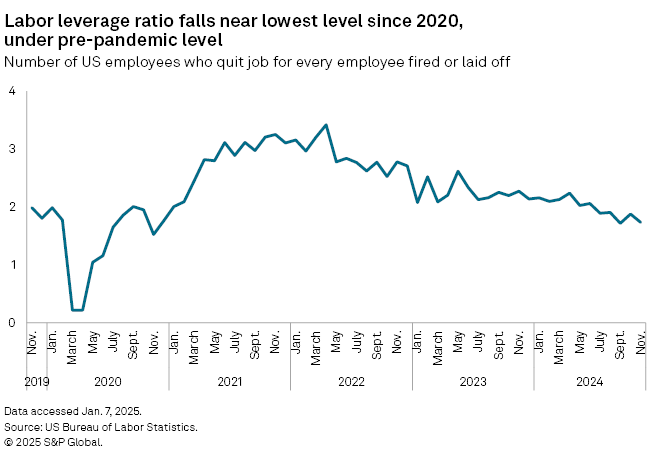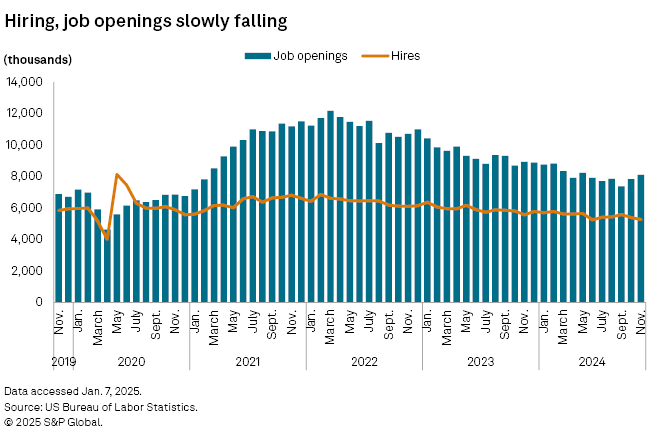Featured Topics
Featured Products
Events
S&P Global Offerings
Featured Topics
Featured Products
Events
S&P Global Offerings
Featured Topics
Featured Products
Events
S&P Global Offerings
Featured Topics
Featured Products
Events
Financial and Market intelligence
Fundamental & Alternative Datasets
Government & Defense
Professional Services
Banking & Capital Markets
Economy & Finance
Energy Transition & Sustainability
Technology & Innovation
Podcasts & Newsletters
Financial and Market intelligence
Fundamental & Alternative Datasets
Government & Defense
Professional Services
Banking & Capital Markets
Economy & Finance
Energy Transition & Sustainability
Technology & Innovation
Podcasts & Newsletters
8 Jan, 2025
Labor bargaining power has declined to its lowest levels since the early days of the COVID-19 pandemic, suggesting that US workers' influence over employers is diminishing in a softening job market.
About 1.74 employees quit their jobs for every employee fired or laid off in November 2024, according to data released by the US Bureau of Labor Statistics on Jan. 7. This ratio, a labor bargaining power proxy known as the labor leverage ratio, has fallen by about half from its most recent peak of 3.42 in April 2022 and is near its lowest level since the pandemic ravaged the job market in early 2020.
The decline reflects restrictive monetary policy from the US Federal Reserve and a pullback from the surge in labor market activity following pandemic business closures and layoffs. While economists expect a rebound could be on the horizon, recent data signals workers are increasingly reluctant to quit jobs and have less bargaining power against employers than a few years ago.
"Workers are clearly losing leverage and have been losing it, slowly and gradually, for quite a while," said Guy Berger, director of economic research at the Burning Glass Institute.

The ratio has cooled with the broader labor market as hiring has plunged roughly 34% since March 2022 highs, increasing reluctance throughout the workforce to quit a job due to fear of not being able to find another one, Berger said.
Rising interest rates have increased household expenses and slowed business expansions, reducing both hiring and quitting, said Aaron Sojourner, a labor economist at The W.E. Upjohn Institute for Employment Research who developed the labor leverage ratio.
"Labor leverage in the economy soared when employers were competing to hire simultaneously in 2021 and 2022 and millions of workers quit old jobs to upgrade to better ones," Sojourner said.
As the Fed began raising rates in March 2022, employers have focused on retaining existing staff, boosting job security for those with jobs but slowing hiring, making job searches a challenge, Sojourner said.
The decline in the worker leverage ratio also reflects the domestic labor market's normalization in the wake of the economic reopening, rehiring frenzy and the so-called Great Resignation, when more than 26 million Americans quit their jobs in the first six months of 2022, said Julia Pollak, chief economist at ZipRecruiter. By comparison, less than 20.5 million Americans quit their jobs in the first six months of 2024, the government data shows.

The shifts in bargaining power are being felt equally throughout the labor market, said Cory Stahle, an economist at the Indeed Hiring Lab. Layoffs are low throughout the job market, but job openings and postings have declined most in knowledge work roles, yet remained relatively steady for in-person and skilled labor jobs, Stahle said.
"Demand for workers is lower now than a few years ago and that means less bargaining power across the board, but workers still have historically strong leverage in some industries including healthcare and accommodation and food services," Stahle said.
Fed, Trump impact
Stabilization may come later this year as the Fed eases monetary policy through rate cuts and the incoming Trump administration potentially implements policies such as a push to increase immigration enforcement, which could induce labor scarcity, Berger with Burning Glass said.
Worker leverage could improve substantially in 2025 if interest rate cuts and lower borrowing costs further boost economic activity, Pollak with ZipRecruiter said.
"Employers who are enjoying calling the shots should be on notice," Pollak said.
Higher vehicle sales, for example, are an early sign that the Fed's loosening of monetary policy is already having an impact, Pollak said. However, hiring tends to follow other economic indicators with a lag.
"It's unclear how long that will be, so it's not clear when exactly labor leverage will begin to rebound," Pollak said. "But such a rebound gets more likely as more banks become prepared to lend to consumers, the retail outlook improves, and sales of big-ticket items recover."